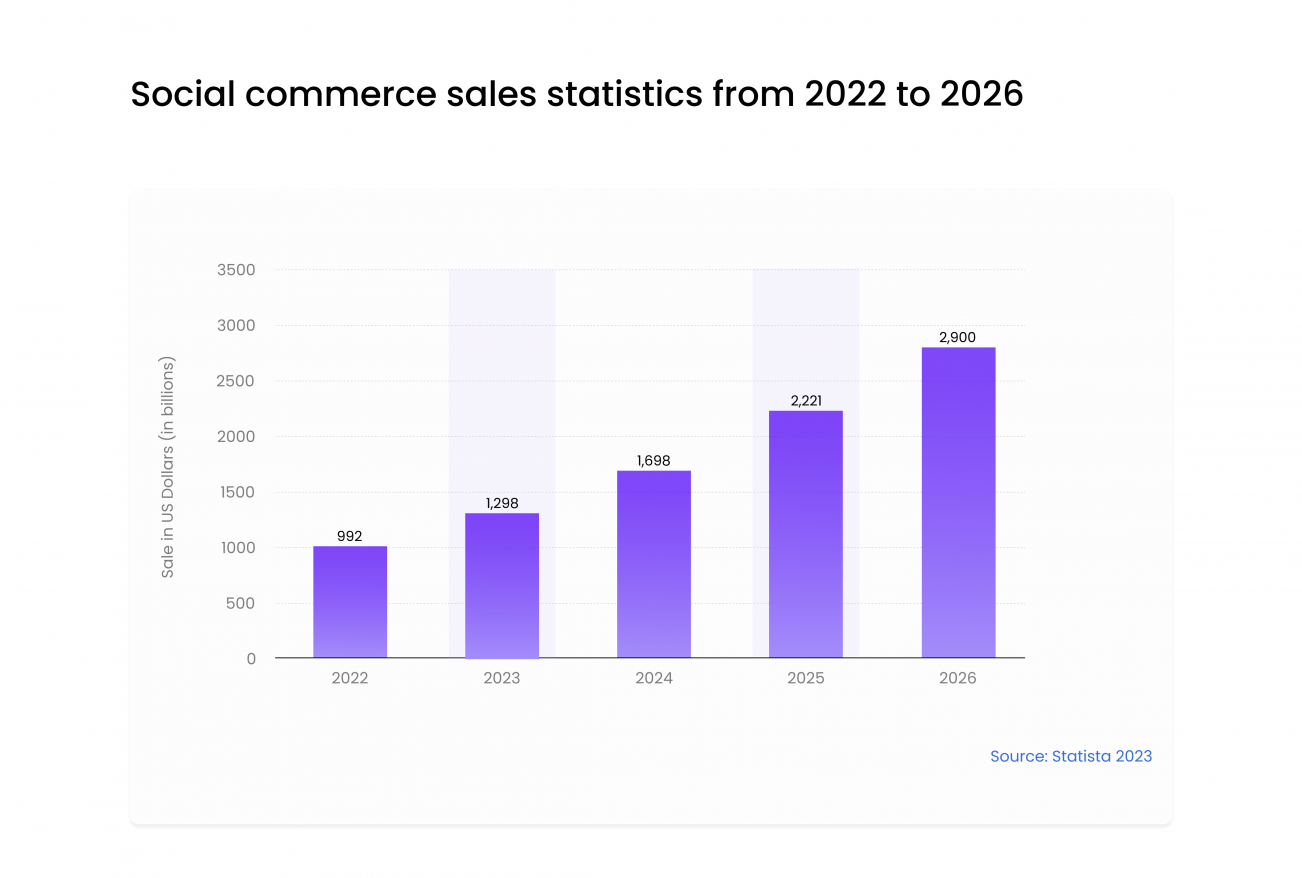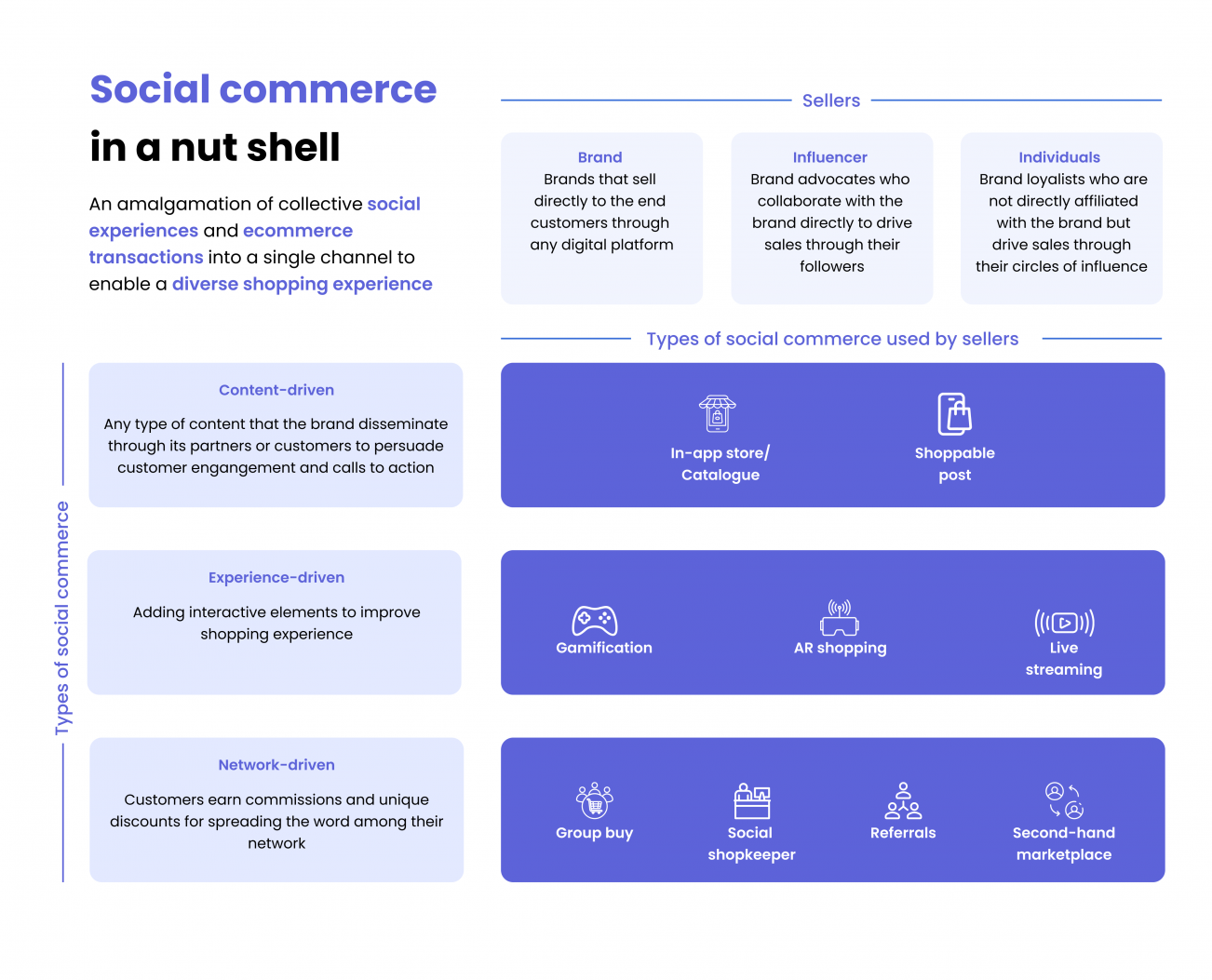Recently during a family get-together, my teenage school-going cousin told me she got off her flaky winter skin with the Jennifer Aniston technique!! I went whaaat?? dropping my jaw several centimeters down, and patting my head to get back into my senses to register what she said. She was all of 14, she knew the actress, she knew how to fix a flaky skin condition with a product that an international actress uses. I had enough reasons to be awestruck!
I further digged-in to know more, and she explained how she had been following the actress who is part of a famous web series and the actress once went live on Instagram with the skincare product she endorsed. The brand also had a sale going on simultaneously on the actress’s page with ‘free international shipping’ too. Well, what more is required? – A clear example of social commerce that can attract customers of various age groups into buying a product for various reasons and get the complete purchase done in a jiffy.
When you like a particular piece of clothing, accessories or a handbag that someone is using, asking them where they get it from is a primitive way. At an age where you get recommendations on your phone as advertisements based on your conversations, referring something to someone is just a matter of clicks!
Ecommerce + social media = Social commerce
Quite precisely, social commerce is the combination of ecommerce and social media where brands can sell their products through various social media platforms. Social commerce enables the digi-savvy and social-savvy generation to discover, research, pick their favorite, and complete the transaction all within the social media app.
For direct selling businesses, what makes social commerce a new opportunity is the frictionless shopping experience and a higher level of customer engagement which helps generate higher customer interest. So how is social commerce different from social selling, aren’t they both the same? Well, not really. Here’s why, while social commerce is about getting sold, social selling is about building customer relationships and improving conversions.
Social selling vs Social commerce
| Social Selling | Social Commerce |
|---|---|
| Does not involve making sales | Involves making sales |
| The target audience is potential customers | The target audience is those interested in purchasing goods/services |
| More of product information/awareness | More of selling a product and generating sales |
| Marketing strategy to promote a product or service, generate leads, and convert prospects into customers | A form of ecommerce used for the sale of products or services on various social media platforms |
| Focuses on customer engagement and lead generation | Focuses on enhancing the shopping experience and driving traffic to online stores |
After having undergone digital transformation, the direct selling industry has made a huge impact in the digital marketing space. Most of the innovative marketing techniques have been tried, tested, and successfully implemented for effective sales and revenue generation. Ecommerce is a major marketing technique that has changed the face of direct selling businesses. However, with the advent of social commerce, the direct selling industry is sure to reinvent sales and marketing like never before for its engaging opportunities and seamless business possibilities.
Social commerce + direct selling = Ingenious success strategy
According to the Statista report, the overall value of social commerce which was at $992 billion in the year 2022 is projected to reach $2.9 trillion by the year 2026.

This statistic is an eye-opener for direct selling companies on why it is imperative to design and implement technological infrastructure that would help brands move at the pace of new opportunities flowing in. Multi-channel ecommerce, flexible commission calculations, online and onhand real-time inventory management, consistent logistics, and exceptional customer services are the key markers to build a stronger foundation to enable a business to transform with social commerce.
Direct selling software and solutions providers have launched state-of-the-art social commerce solutions including integrated point-of-sale mobile apps that can deliver inventory management, customer invoicing, and payment processing. Social commerce solutions can effectively take care of affiliate and influencer programs, customer referral and loyalty programs, direct selling and MLM solutions, and party plan solutions as well. Through intense market research and integrating top-of-the-line content management techniques, businesses right from startups to enterprise levels have made quite evident results with the power of social commerce. Of course, this wasn’t overnight but swiftly compared to traditional brick-and-mortar marketing techniques which take years to get implemented and show results in sales figures.
“As an avid Instagram user, I shop for what I find relevant to my requirements. With pop-up ads, flash deals, promotions, and recommendations that come up on my feed on various social media platforms, I am aware of the market vibe, every ‘viral’ trend, and everything in between. This also helps me support small businesses and brands that are not in the limelight but has incredible products”
– Instagram shopper, Epixel social commerce research survey participant
While TikTok, YouTube, and Facebook came up with this idea of building customer rapport replacing conventional advertising with fun, engaging, and less promotional content, Instagram with its high-end features took over in the social commerce scenario. When an influencer or a celebrity endorses a brand and takes you through their skincare/haircare routine or their ‘day in my life’ with a particular product, it is easy to register the product in the customer’s mind and persuade them to purchase the product.

Benefits of adopting social commerce in direct selling businesses
With social commerce, social selling, and influencer marketing, the way consumers interact with brands has transformed drastically over the last decade. Also, with social commerce, it is easy to keep customers informed about every new product that the brand launches. Many smaller, unestablished brands have found their way to customer hearts with effective social commerce techniques and built brand credibility and loyalty. Direct selling brands have made use of this technique effectively and have seen impeccable results.
Through our rigorous research to keep up with the pace at which trends are fast-changing, our team of experts at Epixel MLM Software has found out how effectively can social commerce solutions be integrated into a platform and how could it be beneficial to a direct selling ecommerce business.
Improve customer engagement
What makes social commerce different from ecommerce is the very word ‘social’ which has more people factors. Direct selling brands focus on building brand image through social media platforms to encourage customers to interact and engage with the brand effectively and regularly. Leverage the power of user-generated content as a sales tool when a customer responds to a survey or shares their opinion, or experiences based on a product or service they purchased. Keeping in constant touch with the customer through social media platforms would not only encourage customer engagement but also help improve the growth and revenue of the business by manifolds.
Holistic shopping experience
With improved customer engagement, customers are sure to be enticed by a brand. It is now the brand’s responsibility to retain customers for a longer period of time with a frictionless shopping experience. It is also important to increase the end-to-end experience and to reduce complexity for direct selling brands with multi-level, affiliate-focused, or a mix of both models. Integrating up-to-the-minute sales tools and back-end operational platforms to coordinate together is essential to deliver a comprehensive experience for customers. With these features, motivating them to shop could be the ideal motto of social commerce.
Sell swiftly to a highly targeted audience
With social commerce, your products reach wherever the customers are. And hence, it is up to you to tweak and twist your creative content and product specifications according to your targeted audiences’ likes and preferences. With abundant data available in the social space and analytics capabilities with which customers' shopping patterns and purchase behaviors can be tracked, you could curate your brand experience to convert your prospects into loyal customers. Social commerce is a window of opportunity for direct selling businesses to sell specific, ready-to-buy products for people with specific likes and dislikes.
Find out from our customers how our solutions give MLM businesses an edge and exceed customer expectations
Without a doubt, social commerce is a powerful sales tool that can create a consistent and engaging customer experience streamlining various business channels together. Direct selling businesses with omnichannel business strategies can leverage the power of social commerce to drive sales from every nook and corner of their sales channel. Vivid social commerce techniques like comment selling (selling through comments section under a post on a social media platform) are taking the direct selling business by storm. At a time when staying social is essential to build brand credibility and robust customer relationships, social commerce is a necessity for a brand’s growth at many levels.









Leave your comment
Fill up and remark your valuable comment.